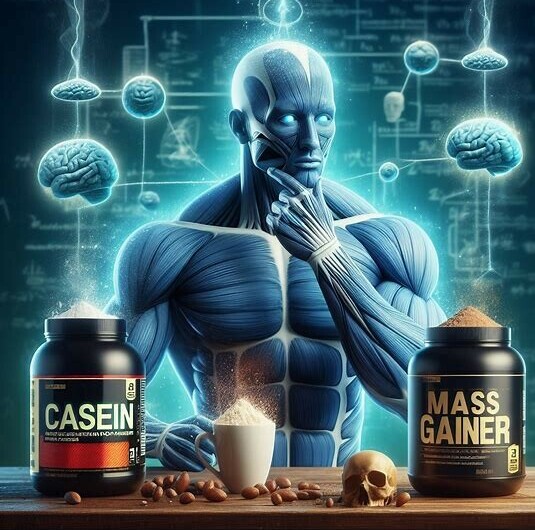Answer: Casein is more versatile than mass gainer. Whilst Mass gainer is certainly more superior for bulking, Casein can also be used for bulking, although it’s slightly less suitable. Moreover, Casein has less side effects, is more suitable for maintaining and cutting. Unfortunately, it is more expensive. Mass gainer is especially suited for promoting a caloric surplus. Casein is suitable in more situations than Mass gainer.

Macros
When looking at the macros, it’s clear that casein protein powder dominates when it comes to the protein content (70.6% in comparison to 14.8%). Furthermore, although the fat and sugars are similar, mass gainer has a lot more carbs than casein.
The reason for this is that mass gainers aim to get a large mix of protein and carbs, whereas casein primarily focuses on maximising protein. Mass gainers focus on maximising the calories, to maintain a caloric surplus. Manufacturers achieve this by adding in more carbs. With casein, it’s a ‘protein’ powder, so it’s solely focused on protein maximisation.
The caloric amount varies, but mass gainers do have more calories than casein protein powder. Although the difference does not seem that large, the serving size for mass gainer (on average) is significantly larger. Naturally, you would be consuming more calories with mass gainer than casein protein powder, as both the serving size and ingredients make the calories much more.
| Macros | Mass gainer (50g serving) | Casein Protein Powder (50g serving) |
|---|---|---|
| Calories | 186 | 176 |
| Protein | 7.4g | 35.3g |
| Carbs | 37.6g | 4.4g |
| Fat | 0.6g | 1.5g |
| Total sugars | 3g | 1.5g |
Ingredients
Typically it look likes the following
For casein:
– Casein concentrate (Could be a milk protein concentrate or micellar casein)
– Flavours
– Sweeteners
Mass gainers:
– A protein blend
– Natural and artificial flavours
– Sweeteners
– Salt
– Vegetable gums
– Thickeners
– Digestive enzymes
– Creatine
– Fats
– Magnesium
– Starch
This is just a general description for both products, as each manufacturer will use their own amounts. However, mass gainers will use much more ingredients than casein protein powder because of it’s purpose. To increase calories and add the ‘mass’, the manufacturers add in a multitiude of carbs and fats to achieve this. Furthermore, to help with digestion and ensure a better taste, there will be thickeners, enzymes and the flavours added.
Casein protein powder typically has a lower amount of ingredients because it’s primarily focused on getting a high amount of protein. There is no need to add in a bunch of fillers, thickeners, gums because there aren’t any other ingredients that would negatively impact the consistency and taste of the product. The only other ingredients would be flavours and sweeteners to get a specific taste.
For Bulking
Mass gainers are superior for bulking.
To bulk effectively, you need to be eating in a caloric surplus (eating more calories than your body needs to maintain it’s weight). Mass gainers, because of their ingredient and large serving size (link) make it ideal for bulking. There is a decent amount of protein, a lot of carbs for energy, a decent amount of fat and a large amount of calories.
Whilst casein protein powder has a higher concentration of protein, the carbs and calories are lower. Additionally, if you’re already eating a diet that has a decent amount of protein (which you should be when bulking), then the protein amount from the casein becomes less important. The protein you gain from the mass gainer should be enough. You’ll want to ensure that you have enough energy when training to actually stimulate muscle growth. The carbs from the mass gainer (and your overall diet) help with that.
If you only need an extra 200 calories to complete your surplus, then you could opt for casein since you don’t need that many extra calories. However, anymore than that and mass gainer is ideal.
For Cutting
Casein protein powder is superior for cutting.
To cut effectively, you need to be eating in a caloric deficit (eating less calories than your body needs to maintain it’s weight). To ensure that you’re losing fat and not muscle, adequate protein is required.
Furthermore, staying away from high-calorie snacks is necessary.
Casein protein powder has lower calories than mass gainer, with a higher amount of protein. Casein focuses on protein, rather than calories and carbs like mass gainer. It can be hard to stay in a caloric deficit with high protein when you’re using mass gainer. This is because you’ll need a larger serving size to get more protein. However, this means you’ll be consuming more calories and will have less calories to work with in other areas.
Additionally, casein is a slow-digesting protein. What this means is that it slowly releases in your body, keeping you fuller for longer. Casein can take up to 6-7 hours to fully digest. This means that your cravings to eat high-calorie snacks will be lowered since you’d still be feeling full from the casein protein powder. Casein is also low in fat, which is good for those that want to eat low in fat when cutting.
For Maintaining
Casein protein powder is superior for maintaining.
The reason is because casein has a lower amount of calories, carbs and fats. This is all whilst having more protein. When you’re trying to maintain your body composition, you want to maintain your weight as best as you can.
You’d want to keep your calories in check, and this is what casein can help you do. If you were to use a mass gainer to maintain, you’d primarily be getting a bunch of calories, with a decent amount of protein, carbs, and fats. This isn’t bad at all, but casein protein powder is simply more preferrable. You get a higher concentration of protein, with a slightly lower amount of carbs and fats. When you’re maintaining, you’re typically not too worried about getting a high amount of carbs and fats so this is why casein is superior.
Cost?
Casein is typically more expensive than mass gainer.
This is because of the filtration process that casein undergoes to isolate the protein. Some mass gainers are more expensive than casein, but generally, casein is more expensive.
Side effects?
Mass gainer has more side effects.
This is because of the various ingredients and the serving size recommendations. With the fillers, additives, vegetable gums and vegetable oils, this presents more opportunities for side effects than casein. You could experience the following:
– Dehydration
– Kidney damage
– Liver damage
– Digestive issues
– Constipation
However, the likelihood of these effects occurring is quite low and will only occur if you have an excessively high amount of mass gainer, over a long period of time. Additionally, if the ingredients are low quality, the risk increases. It’s important to choose a mass gainer that is of higher quality.

Key Takeaways
– Casein has a lower amount of ingredients and has less side effects
– Casein is superior for cutting and maintaining.
– Mass gainer is superior for bulking and is generally cheaper
– Mass gainer can be used for maintenance, but it’s better suited for bulking.
– The likelihood of the side effects happening are low, as it depends on excessive use and quality.



